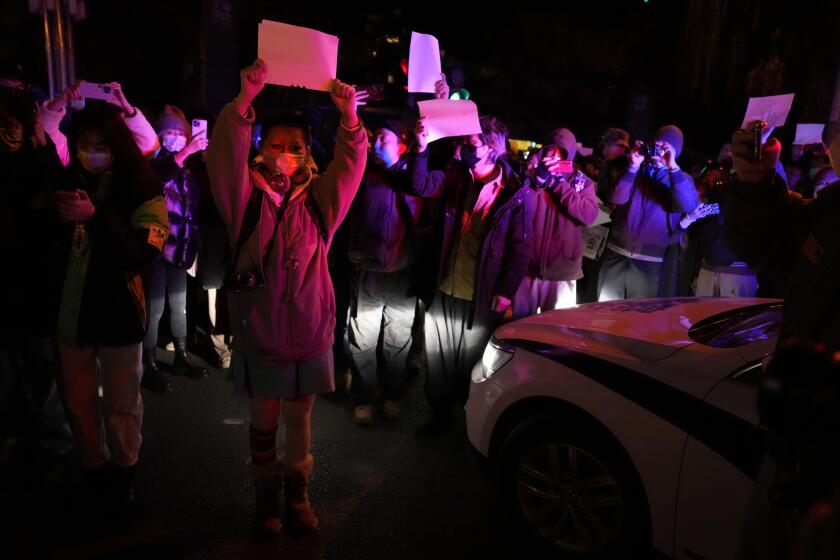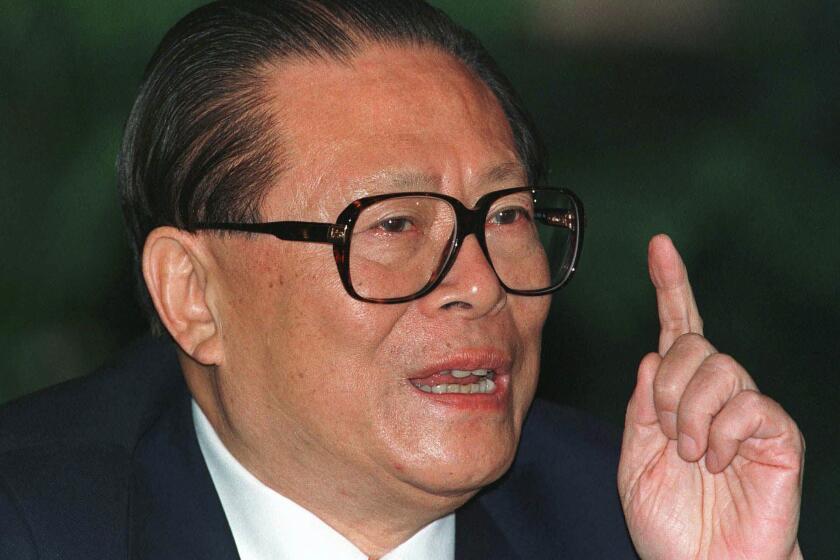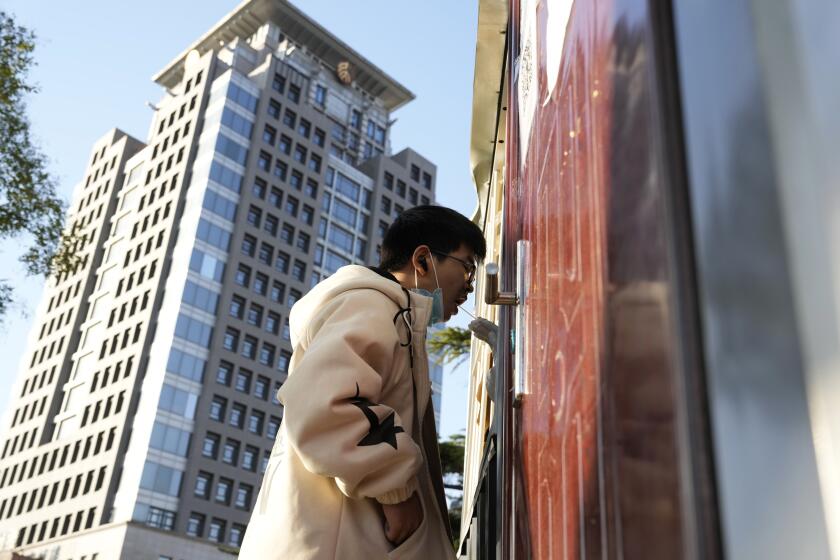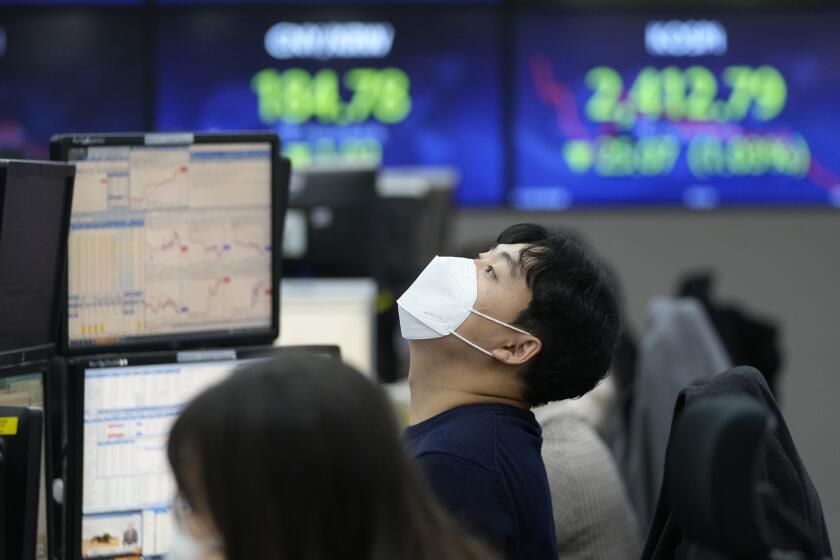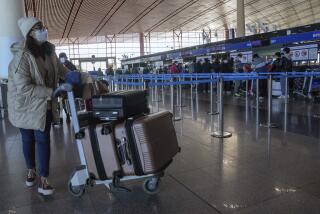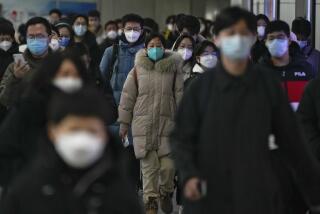China vows crackdown on ‘hostile forces’ following protests over COVID policy

- Share via
BEIJING — China’s ruling Communist Party has vowed to “resolutely crack down on infiltration and sabotage activities by hostile forces,” following the largest street demonstrations in decades staged by citizens fed up with strict anti-coronavirus restrictions. A massive show of force by the security services Wednesday sought to deter further protests.
The statement from the Central Political and Legal Affairs Commission, released late Tuesday, comes amid a massive show of force by security services to deter a recurrence of the protests that broke out over the weekend in Beijing, Shanghai, Guangzhou and several other cities.
While it did not directly address the protests, the statement serves as a reminder of the party’s determination to enforce its rule.
Hundreds of SUVs, vans and armored vehicles with flashing lights were parked along Beijing’s streets Wednesday while police and paramilitary forces conducted random ID checks and searched people’s mobile phones for photos, banned apps or other potential evidence that they had taken part in the demonstrations.
The number of people who have been detained at the demonstrations and in follow-up police actions is not known.
While reports and footage of the protests have flourished online before being scrubbed by government censors, they have been ignored entirely by the strictly controlled state media. Further diverting attention was Wednesday’s announcement that former President Jiang Zemin had died, which dominated the evening’s national news.
U.S. officials say the Biden administration supports the right to protest, but have offered little more.
The commission’s statement, issued after an expanded session Monday led by its head, Chen Wenqing, a member of the party’s 24-member Politburo, said the meeting aimed to review the outcomes of October’s party congress.
At the congress, President Xi Jinping granted himself a third five-year term as secretary general — potentially making him China’s leader for life — stacked key bodies with loyalists and eliminated dissenting voices.
“The meeting emphasized that political and legal organs must take effective measures to … resolutely safeguard national security and social stability,” the statement said.
“We must resolutely crack down on infiltration and sabotage activities by hostile forces in accordance with the law, resolutely crack down on illegal and criminal acts that disrupt social order and effectively maintain overall social stability,” it said.
Jiang Zemin led China out of isolation after the Tiananmen Square massacre and supported economic reforms that led to a decade of explosive growth.
Yet less than a month after seemingly ensuring his political future and unrivaled dominance, Xi, who has signaled that he favors regime stability above all, is facing his biggest public challenge yet.
He and the party have yet to directly address the unrest, which spread to college campuses and the semi-autonomous southern city of Hong Kong, as well as sparking sympathy protests abroad.
Most protesters focused their ire on the “zero-COVID” policy that has placed millions under lockdown and quarantine, limiting their access to food and medicine while dragging down the economy and severely restricting travel. Many mocked the government’s ever-changing line of reasoning, as well as claims that “hostile outside foreign forces” were stirring the wave of anger.
Even bolder voices called for greater freedom and democracy and for Xi, China’s most powerful leader in decades, as well as the party he leads, to step down — speech considered subversive and punishable by lengthy prison terms. Some held up blank pieces of white paper to demonstrate their lack of free-speech rights.
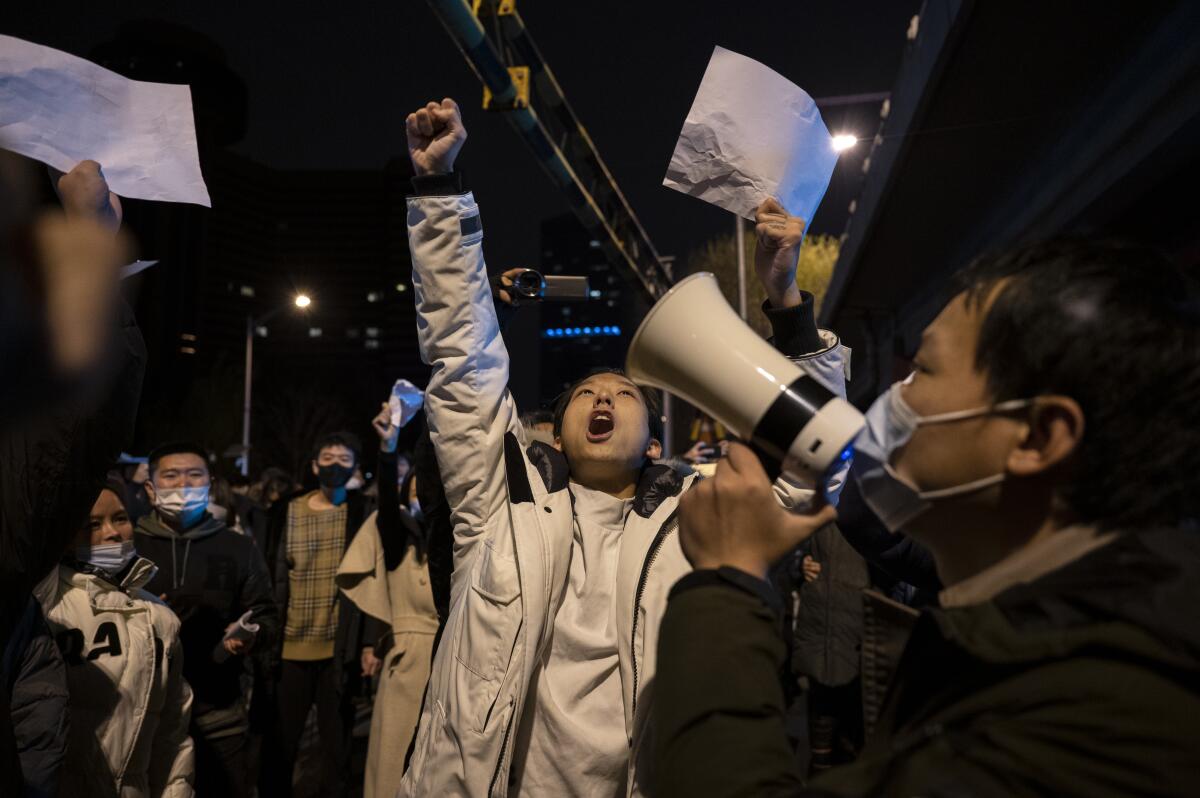
The weekend protests were sparked by anger over the deaths of at least 10 people in a fire Thursday in China’s far west that prompted angry questions online about whether firefighters or victims trying to escape were blocked by anti-COVID controls.
After the demonstrations, authorities eased some controls and announced a new push to vaccinate vulnerable groups, but maintained they would stick to the “zero-COVID” strategy.
The party had already promised last month to reduce disruptions, but a spike in infections swiftly prompted party cadres, under intense pressure, to tighten controls in an effort to prevent outbreaks. The National Health Commission on Wednesday reported 37,612 cases detected over the previous 24 hours, while the death toll remained unchanged at 5,233.
Beijing’s Tsinghua University, where students protested over the weekend, and other schools in the capital and the southern province of Guangdong sent students home in an apparent attempt to defuse tensions. Chinese leaders are wary of universities, which have been hotbeds of activism, including the 1989 Tiananmen pro-democracy protests that ended in a massacre.
Students and faculty at Peking University were not allowed to leave the grounds unless necessary, and classes were moved online through Friday.
Police appeared to be trying to keep their crackdown out of sight, possibly to avoid encouraging others by drawing attention to the scale of the protests. Videos and posts on Chinese social media about protests were deleted by the party’s vast online censorship apparatus.
“Zero COVID” has helped keep case numbers lower than those of the United States and other major countries, but global health experts, including the head of the World Health Organization, increasingly say it is unsustainable. China dismissed the remarks as irresponsible.
Economists and health experts warn that Beijing can’t relax controls that keep most travelers out of China until tens of millions of older people are vaccinated. They say that means “zero COVID” might not end for as much as another year.
On Wednesday, U.S. Ambassador to China Nicholas Burns said restrictions were, among other things, making it impossible for U.S. diplomats to meet with American prisoners being held in China, as is mandated by international treaty. Because of a lack of commercial airline routes into the country, the embassy has to use monthly charter flights to move its personnel in and out.
News Alerts
Get breaking news, investigations, analysis and more signature journalism from the Los Angeles Times in your inbox.
You may occasionally receive promotional content from the Los Angeles Times.
“COVID is really dominating every aspect of life” in China, he said in an online discussion with the Chicago Council on Global Affairs.
On the protests, Burns said the embassy was observing their progress and the government’s response, but added: “We believe the Chinese people have a right to protest peacefully.”
“They have a right to make their views known. They have a right to be heard. That’s a fundamental right around the world. It should be. And that right ... shouldn’t be interfered with,” he said.
Burns also referenced instances of Chinese police harassing and detaining foreign reporters covering the protests.
Stocks closed lower on Wall Street as protests spread in China calling for President Xi Jinping to step down.
“We support freedom of the press as well as freedom of speech,” he said.
In Tokyo, scores of protesters took to the streets Wednesday to support the Chinese demonstrations. Dozens of the protesters in the Japanese capital, mostly ethnic Chinese, held signs in Japanese, Chinese and English that said, “Xi Jinping step down” and “Crush the Communist Party.”
Asked about foreign expressions of support for the protesters, Chinese Foreign Ministry spokesperson Zhao Lijian defended China’s approach to handling COVID-19 and said other nations should mind their own business.
“We hope they will first heed their own people’s voices and interests instead of pointing fingers at others,” Zhao told reporters at a daily briefing.
More to Read
Sign up for Essential California
The most important California stories and recommendations in your inbox every morning.
You may occasionally receive promotional content from the Los Angeles Times.
